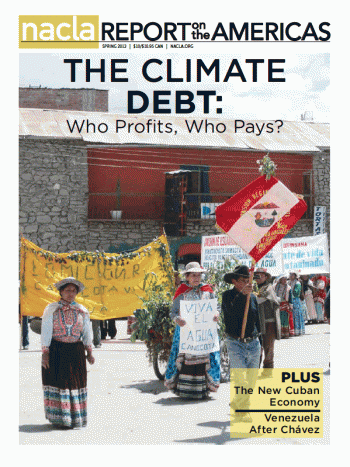Report
Economic growth and most of the creature comforts enjoyed in developed and, increasingly, developing countries depend on the instant availability of power. Our lives would quickly become unrecognizable if the power stopped coming.
In the months since Rio+20, the euphoric energy has dimmed and civil society is divided. In Brazil’s climate-justice community, a defiant pessimism now reigns, while a triumphant state mostly gets its way.
Like their conservative neighbors, left-leaning governments are entangled in Latin America’s renewed dependence on natural-resource extraction. It is not clear whether these regimes can pursue the deepening of social, political, and economic democratization while they are still resource pools for the destructive global assault on nature and the climate.
Nicole Fabricant and Kathryn Hicks
Climate-justice activists are up against fossil-fuel giants from the Global North intent upon blocking any meaningful progress on reduction of carbon-dioxide emissions, as well as the capitalist economy itself, and the dependence on nonrenewable resources to fuel a particular way of life.
Nation-states in the Global South have historically contributed the least to carbon-dioxide emissions but are especially vulnerable to the consequences of climatic shifts because of the damage wrought by extractive industries and the limited resources to cope with such damage.
Climate change in the Andes is a kind of chronic disaster that creates winners and losers and thus power struggles within a water regime influenced by individualized responsibilities. The struggle of poor and indigenous people for collective responsibilities in water management is thus an attempt to take control of an uncertain future.
Unión Base, Puyo, August 3rd, 2009
CONFENIAE’s Denunciation of REDD Initiatives.
In Bolivia a broad political and cultural exercise is taking place that explores what should be understood as “alternatives to development.” New issues, like vivir bien and the rights of nature, represent examples of such alternatives, which should be differentiated from “development alternatives.”
Often unable to tax or collect annual dues from their residents, the leaders of indigenous territories must seek funds to support their governance by working with outsiders. Territorial titling can thus pressure residents into new entanglements with capital, state bureaucracies, and foreign organizations.

